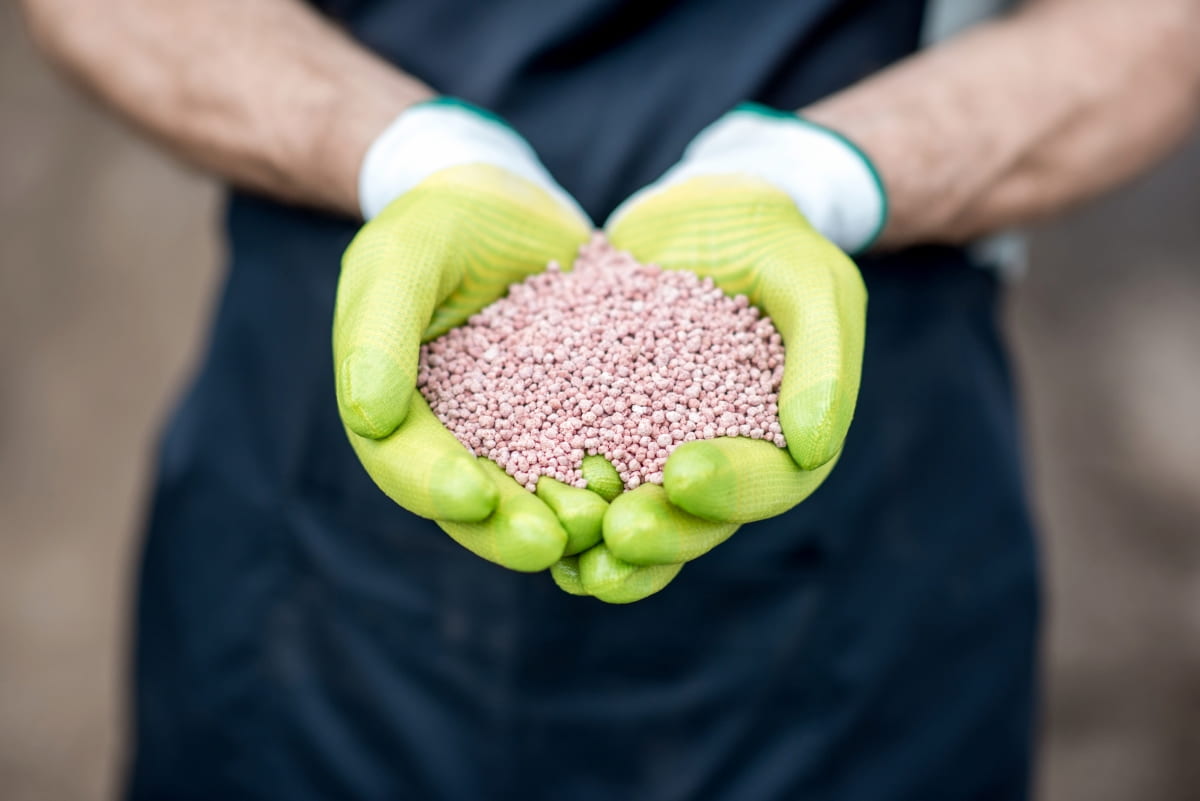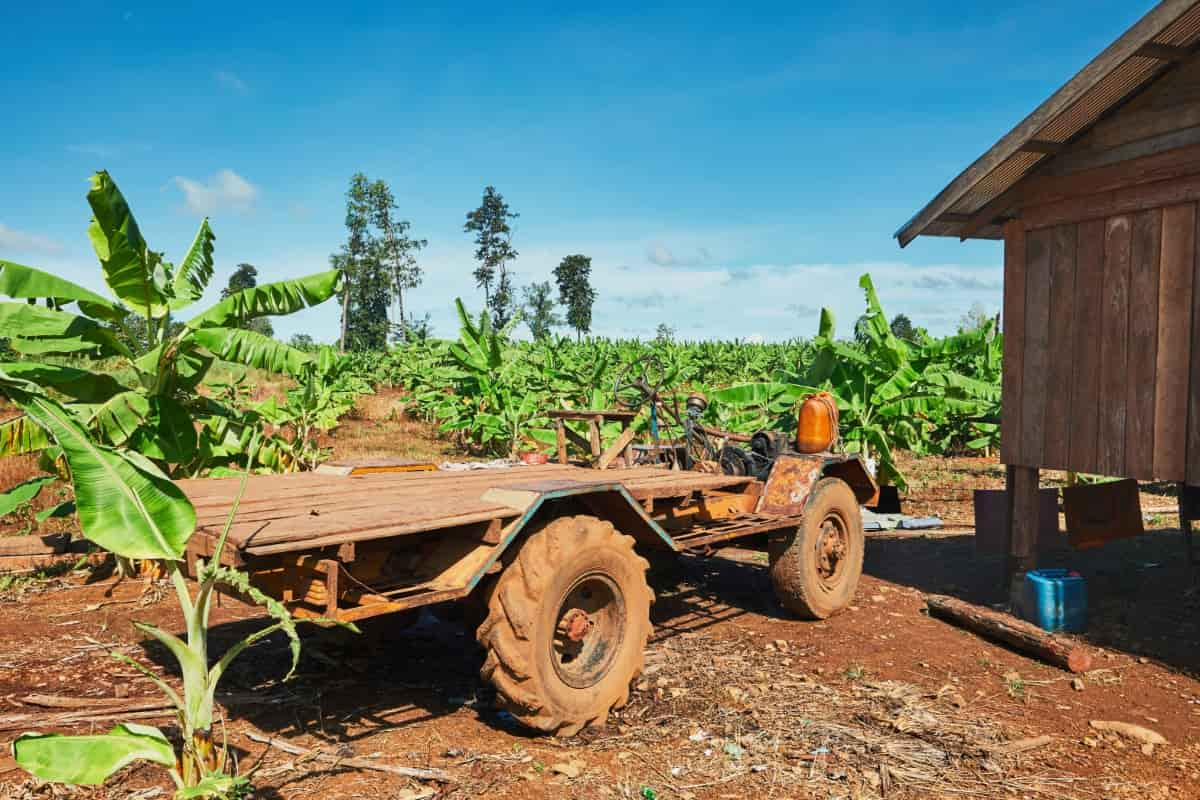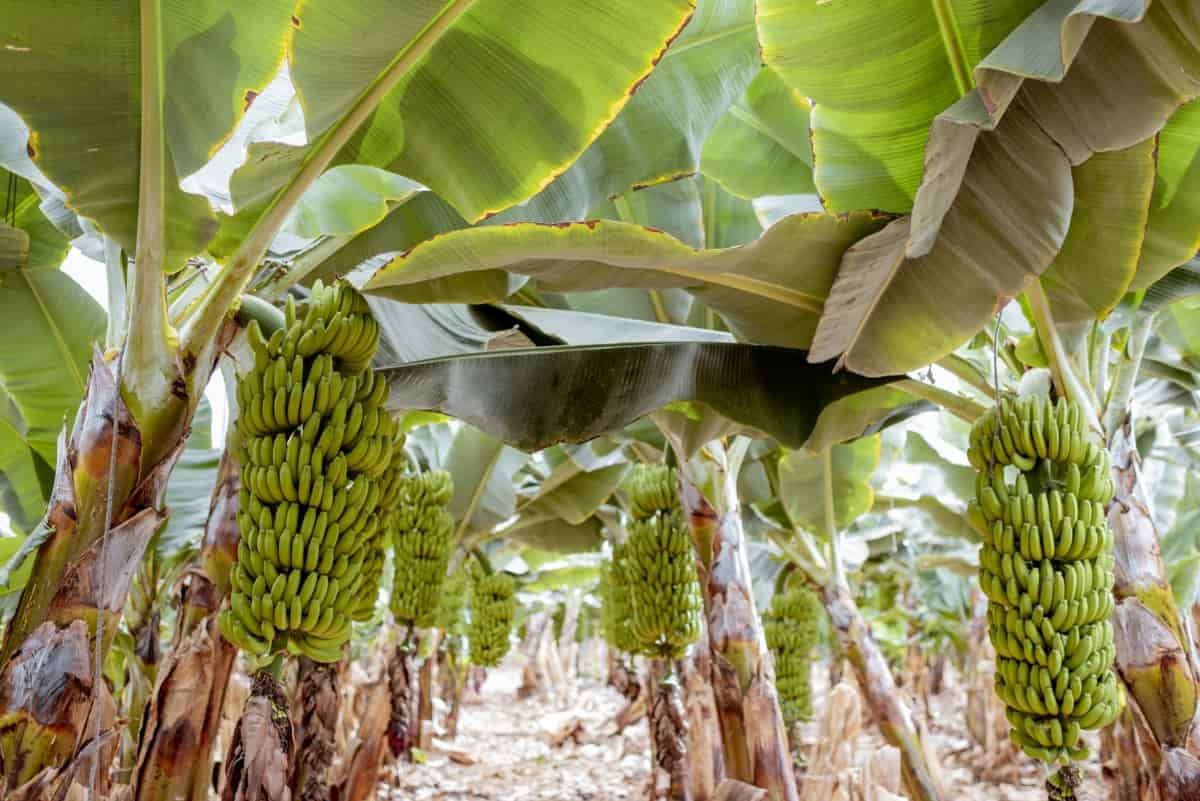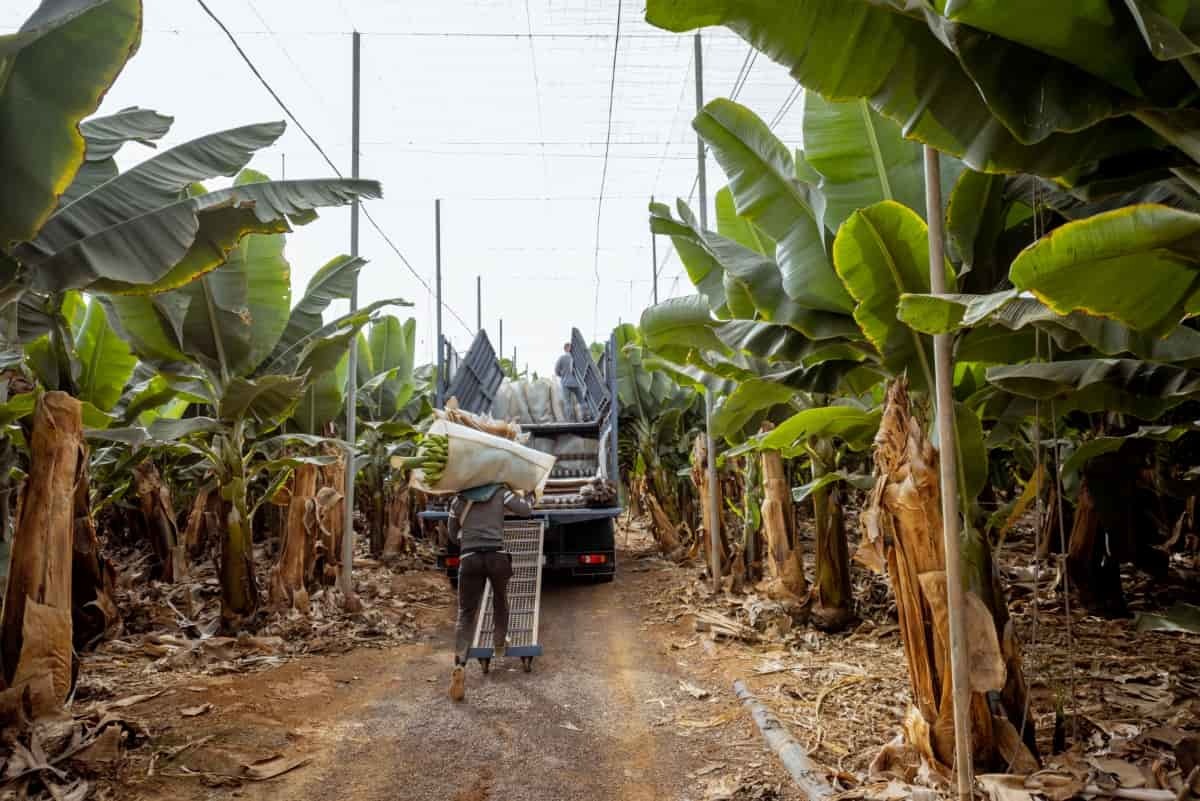Banana plants have distinct nutritional needs for optimal growth and fruit production. They require a balanced diet of macronutrients (nitrogen, phosphorus, and potassium) to promote healthy foliage, root development, and robust fruit formation. In addition to macronutrients, bananas also benefit from a range of micronutrients, such as magnesium, calcium, and iron, which are critical for enzyme activity and photosynthesis.

Deficiencies in these nutrients can lead to stunted growth and reduced fruit quality. Adjust fertilizer amounts based on soil test results to prevent overfeeding or deficiencies, as banana plants are sensitive to excess nutrients. Proper nutrient management ensures healthy banana plants and abundant fruit production.
Best Fertilizers for Banana Plants
Essential Nutrients for Optimal Growth of Banana Plants
- Nitrogen (N): Crucial for leaf and stem development, promoting vigorous growth and lush foliage.
- Phosphorus (P): Supports root development, flower formation, and fruit setting, critical for early growth.
- Potassium (K): Enhances overall plant health, aids fruit development, and helps plants resist stressors like diseases and drought.
- Calcium (Ca): It is essential for cell wall formation and preventing disorders like banana tip burn.
- Magnesium (Mg): Vital for chlorophyll production and photosynthesis, ensuring healthy leaves.
- Sulfur (S): Necessary for amino acid and protein synthesis, contributing to the plant’s overall growth.
- Iron (Fe), Zinc (Zn), and Manganese (Mn): Micronutrients vital for enzyme activation, photosynthesis, and overall plant health.
The Role of Macronutrients in Banana Plant Nutrition
Nitrogen (N): Nitrogen is essential for producing amino acids, proteins, and chlorophyll, which are crucial for overall growth. It promotes healthy foliage, stem development, and abundant leaves, ensuring robust photosynthesis.
Phosphorus (P): Phosphorus supports root development, flower formation, and fruit setting in banana plants. It’s particularly vital during the early stages of growth and contributes to developing strong root systems.
Potassium (K): It is essential for overall plant health. It aids in fruit development, improving fruit quality, size, and taste. Additionally, potassium enhances the plant’s resistance to various stress factors like diseases and drought.
Micronutrient Management for Healthy Banana Plants
- Iron (Fe): Monitor soil pH to ensure iron availability. Correct iron deficiencies with iron chelates or ferrous sulfate for greener, healthier leaves.
- Zinc (Zn): Adequate zinc is vital for proper fruit development. Use zinc-containing fertilizers if deficiency symptoms appear, like stunted growth and small, distorted fruit.
- Manganese (Mn): Manganese supports photosynthesis. Apply manganese-containing fertilizers if leaves show interveinal chlorosis (yellowing between veins).
- Copper (Cu): While needed in small amounts, copper is essential. Excessive copper can be toxic, so use copper-containing fertilizers judiciously.
- Boron (B): Maintain proper boron levels to prevent fruit deformities. Apply boron-containing fertilizers if necessary.
In case you missed it: How to Prepare the Land for Banana Plantation: Soil Requirements and Preparation Steps

Organic Fertilizers for Sustainable Banana Plantations
- Compost: Rich in organic matter, compost improves soil structure, moisture retention, and nutrient availability. It releases nutrients gradually, enhancing overall plant health.
- Manure: Well-rotted animal manure, such as cow or chicken manure, provides essential nutrients and organic matter. It enriches the soil and promotes microbial activity.
- Fish Emulsion: This liquid organic fertilizer is a good nitrogen, phosphorus, and potassium source. It can also be used as a foliar spray for quick nutrient uptake.
- Seaweed and Kelp: These products are rich in micronutrients and growth-promoting hormones. They can enhance plant health and fruit quality.
- Bone Meal: A slow-release source of phosphorus and calcium, bone meal supports root development and fruit formation.
- Wood Ash: Wood ash provides potassium and raises soil pH, benefiting banana plants in slightly acidic soils.
Slow-Release Fertilizers for Long-Term Nutrient Supply to Banana Plants
Slow-release fertilizers are ideal for providing long-term nutrient supply to banana plants. These fertilizers contain coated or granular forms of essential nutrients, gradually releasing them into the soil over an extended period. This ensures a steady and consistent nutrient availability for the plants, reducing the risk of over-fertilization and leaching.
Slow-release fertilizers offer convenience, requiring less frequent application, and their controlled nutrient release supports sustained growth and fruit production. They are particularly beneficial for banana plants, as they minimize the risk of nutrient deficiencies and excesses, contributing to healthier, more resilient plants and higher yields in the long run.
Liquid Fertilizers for Quick and Efficient Nutrient Uptake by Banana Plants
Liquid fertilizers provide a rapid and efficient means of delivering essential nutrients to banana plants. These fertilizers are dissolved in water, allowing quick absorption through the plant’s roots and leaves. This facilitates speedy nutrient uptake, promoting vigorous growth and robust development.
In case you missed it: The Complete Guide to Banana Farming: Steps of Planting to Harvesting for Beginners

Liquid fertilizers are especially valuable during critical growth stages or when immediate nutrient correction is needed. They are versatile and can be applied through irrigation systems or as foliar sprays, ensuring precise nutrient delivery. However, it’s important to follow recommended application rates to prevent over-fertilization. Utilizing liquid fertilizers effectively can lead to healthier banana plants with improved fruit quality and yield.
Foliar Fertilization Techniques for Improved Nutrient Absorption in Banana Plants
- Apply foliar fertilizers during the early morning or late afternoon when the stomata are open for optimal nutrient uptake.
- Dilute the fertilizer appropriately to avoid leaf burn and ensure uniform coverage.
- Use a balanced liquid fertilizer with essential nutrients like nitrogen, potassium, and micronutrients.
- Consider adding adjuvants to enhance adhesion and nutrient absorption.
- Apply foliar fertilizers regularly, ideally in a planned schedule, to provide a continuous nutrient supply, promoting healthier foliage, fruit development, and overall banana plant vigor.
Frequently Asked Questions
What Foliar Fertilizer for Bananas?
For banana plants, a recommended foliar fertilizer is a potassium sulfate (K2SO4) solution at a concentration of 1% (10 grams per liter of water). Additionally, when planting, you can add 225 grams of muriate of potash and 125 grams of urea per pit, along with well-decomposed farmyard manure (FYM), followed by irrigation.
What is the Best Fertilizer for Banana Plants?
The best fertilizer for banana plants is often balanced with an NPK ratio like 8:10:8. This composition provides essential nutrients for healthy banana growth, with a slightly higher proportion of phosphorus to promote root development and flowering. However, the specific fertilizer needs may vary depending on soil conditions and local recommendations.
What is the Best Organic Fertilizer for Banana Plants?
Composted manure is considered one of the best organic fertilizers for banana plants. It provides a balanced mix of nutrients like nitrogen, phosphorus, potassium, and micronutrients. Composted manure improves soil structure, enhances moisture retention, and encourages beneficial microbial activity.
What Liquid Fertilizer for Banana Plants?
Organic liquid fertilizers suitable for banana plants include compost tea, fish emulsion, and seaweed extracts. These provide essential nutrients to promote healthy banana growth while adhering to organic farming principles.
In case you missed it: Banana Crop Profile: Cultivation, Varieties, Fertilizers, Yield, and Production Practices

Conclusion
The best fertilizers for banana plants depend on specific needs and goals. Organic options like compost and manure promote sustainability and soil health. Slow-release fertilizers offer long-term nutrient supply, while liquid fertilizers provide quick uptake and response. Foliar fertilization can address immediate deficiencies. Choosing the right fertilizer type and using it judiciously will optimize banana plant growth and fruit production, catering to the unique requirements of each plantation.
- Feed Your Flock for Less: Top 10 Tips to Save on Chicken Feed
- Ultimate Guide to Ossabaw Island Hog: Breeding, Raising, Diet, and Care
- Hatching Answers: The Top 10 Reasons Your Chickens Aren’t Laying Eggs
- Eggs and Economics: Breaking Down the Cost of Raising Backyard Chickens
- Defend Your Greens: Proven Methods to Keep Iguanas Out of Your Garden
- Ultimate Guide to Cinnamon Queen Chicken: A Comprehensive Guide for Beginners
- Ultimate Guide to California Tan Chicken: Breeding, Raising, Diet, Egg-Production and Care
- Ultimate Guide to Marsh Daisy Chicken: Breeding, Raising, Diet, and Care
- 10 Types of Chicken Farming Businesses You Can Start for Profits